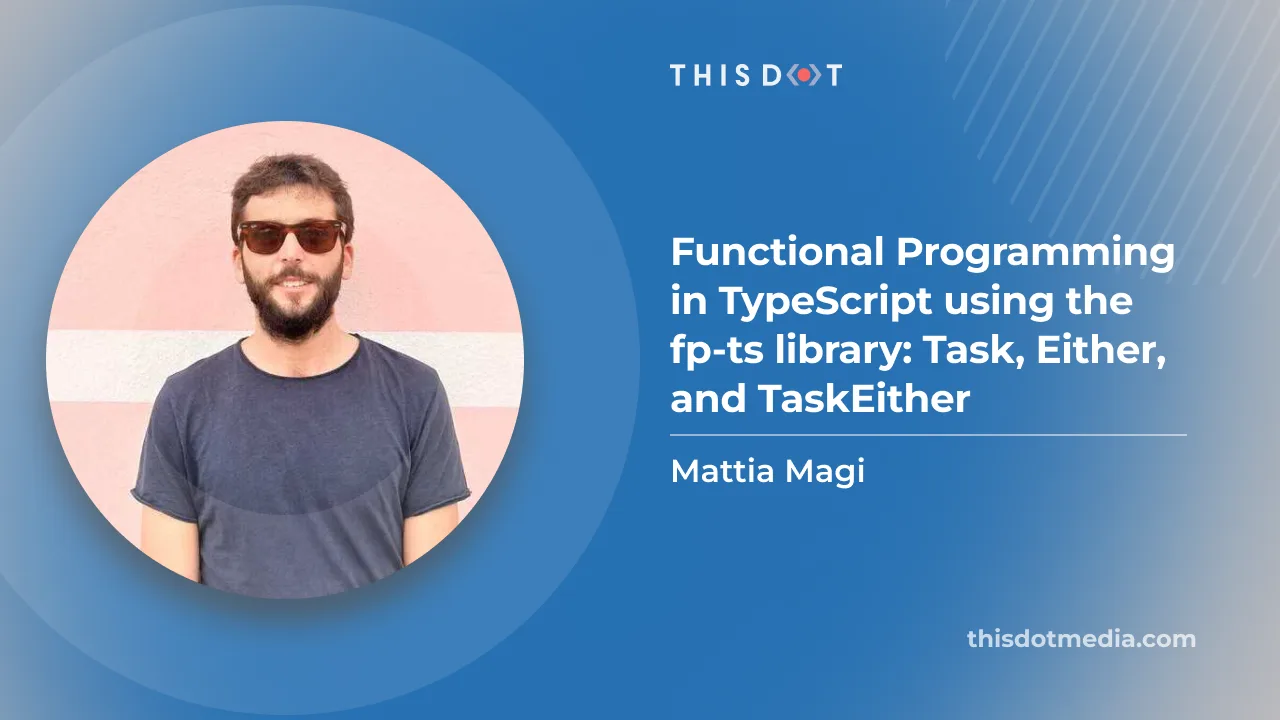Introduction:
Welcome back to our blog series on Functional Programming in TypeScript using the fp-ts library. In the previous three blog posts, we covered essential concepts such as the pipe and flow operators, Option type, and various methods and operators like fold, fromNullable, getOrElse, map, flatten, and chain. In this fourth post, we will delve into the powerful Task and TaskEither operators, understanding their significance, and exploring practical examples to showcase their usefulness.
Understanding Task and TaskEither:
Before we dive into the examples, let's briefly recap what Task and TaskEither are and why they are valuable in functional programming.
Task:
In functional programming, a Task represents an asynchronous computation that may produce a value or an error. It allows us to work with asynchronous operations in a pure and composable manner. Tasks are lazy and only start executing when we explicitly run them. They can be thought of as a functional alternative to Promises.
Now, let's briefly introduce the Either type and its significance in functional programming since this concept, merged with Task gives us the full power of TaskEither.
Either:
Either is a type that represents a value that can be one of two possibilities: a value of type Left or a value of type Right. Conventionally, the Left type represents an error or failure case, while the Right type represents a successful result. Using Either, we can explicitly handle and propagate errors in a functional and composable way.
Example: Handling Division with Either
Suppose we have a function divide that performs a division operation. Instead of throwing an error, we can use Either to handle the potential division by zero scenario. Here's an example:
import { Either, left, right } from 'fp-ts/lib/Either';
const divide: (a: number, b: number) => Either<string, number> = (a, b) => {
if (b === 0) {
return left('Error: Division by zero');
}
return right(a / b);
};
const result = divide(10, 2);
result.fold(
(error) => console.log(`Error: ${error}`),
(value) => console.log(`Result: ${value}`)
);
In this example, the divide function returns an Either type. If the division is successful, it returns a Right value with the result. If the division by zero occurs, it returns a Left value with an error message. We then use the fold function to handle both cases, printing the appropriate message to the console.
TaskEither:
TaskEither combines the benefits of both Task and Either. It represents an asynchronous computation that may produce a value or an error, just like Task, but also allows us to handle potential errors using the Either type. This enables us to handle errors in a more explicit and controlled manner.
Examples:
Let's explore some examples to better understand the practical applications of Task and TaskEither operators.
Example 1: Fetching Data from an API
Suppose we want to fetch data from an API asynchronously. We can use the Task operator to encapsulate the API call and handle the result using the Task's combinators. In the example below, we define a fetchData function that returns a Task representing the API call. We then use the fold function to handle the success and failure cases of the Task. If the Task succeeds, we return a new Task with the fetched data. If it fails, we return a Task with an error message. Finally, we use the getOrElse function to handle the case where the Task returns None.
import { pipe } from 'fp-ts/lib/function';
import { Task } from 'fp-ts/lib/Task';
import { fold } from 'fp-ts/lib/TaskEither';
import { getOrElse } from 'fp-ts/lib/Option';
const fetchData: Task<string> = () => fetch('https://api.example.com/data');
const handleData = pipe(
fetchData,
fold(
() => Task.of('Error: Failed to fetch data'),
(data) => Task.of(`Fetched data: ${data}`)
),
getOrElse(() => Task.of('Error: Data not found'))
);
handleData().then(console.log);
Example 2: Performing Computation with Error Handling
Let's say we have a function divide that performs a computation and may throw an error. We can use TaskEither to handle the potential error and perform the computation asynchronously. In the example below, we define a divideAsync function that takes two numbers and returns a TaskEither representing the division operation. We use the tryCatch function to catch any potential errors thrown by the divide function. We then use the fold function to handle the success and failure cases of the TaskEither. If the TaskEither succeeds, we return a new TaskEither with the result of the computation. If it fails, we return a TaskEither with an error message. Finally, we use the map function to transform the result of the TaskEither.
import { pipe } from 'fp-ts/lib/function';
import { TaskEither, tryCatch } from 'fp-ts/lib/TaskEither';
import { fold } from 'fp-ts/lib/TaskEither';
import { map } from 'fp-ts/lib/TaskEither';
const divide: (a: number, b: number) => number = (a, b) => {
if (b === 0) {
throw new Error('Division by zero');
}
return a / b;
};
const divideAsync: (a: number, b: number) => TaskEither<Error, number> = (a, b) =>
tryCatch(() => divide(a, b), (error) => new Error(String(error)));
const handleComputation = pipe(
divideAsync(10, 2),
fold(
(error) => TaskEither.left(`Error: ${error.message}`),
(result) => TaskEither.right(`Result: ${result}`)
),
map((result) => `Computation: ${result}`)
);
handleComputation().then(console.log);
In the first example, we saw how to fetch data from an API using Task and handle the success and failure cases using fold and getOrElse functions. This allows us to handle different scenarios, such as successful data retrieval or error handling when the data is not available.
In the second example, we demonstrated how to perform a computation that may throw an error using TaskEither. We used tryCatch to catch potential errors and fold to handle the success and failure cases. This approach provides a more controlled way of handling errors and performing computations asynchronously.
Conclusion:
In this blog post, we explored the Task and TaskEither operators in the fp-ts library. We learned that Task allows us to work with asynchronous computations in a pure and composable manner, while TaskEither combines the benefits of Task and Either, enabling us to handle potential errors explicitly.
By leveraging the concepts we have covered so far, such as pipe, flow, Option, fold, map, flatten, and chain, we can build robust and maintainable functional programs in TypeScript using the fp-ts library. Stay tuned for the next blog post in this series, where we will continue our journey into the world of functional programming.

